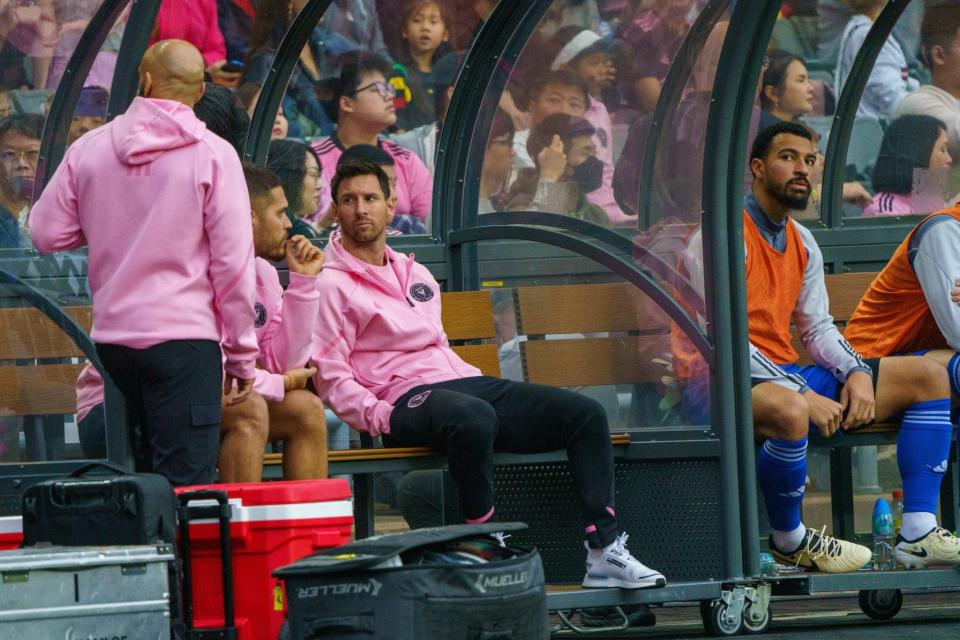Soccer superstar Lionel Messi sat out an exhibition game in Hong Kong, and it cost the organizers $1.9 million in government money

On Sunday, Hong Kong’s soccer fans hoped to catch a glimpse of Inter Miami’s Lionel Messi in a friendly exhibition match against the city's local team.
But their hopes were soon dashed when they learned that both Messi and Inter Miami’s striker, Luis Suárez, would spend the whole game on the sidelines, benched due to health concerns.
Fans booed the team, chanting “refund” after the final whistle when it was clear that neither star athlete would play.
Inter Miami's decision proved costly to its partners. On Monday, the match’s organizers, publisher Tatler Asia, said it would give up $1.9 million in government funding due to Messi’s no-show.
The Messi disappointment is another blow to a city that’s struggled to repair its international image after years of tough COVID-zero policies.
Major acts are skipping the city, and the city’s tourism sector now faces competition from cheaper entertainment options across the border in mainland China.
Messi mess
Tatler Asia, which invited Inter Miami to play in Hong Kong, heavily featured Messi and Suárez in its marketing materials. Tickets to the match cost as much as $600, according to CNBC.
Inter Miami said it benched the two stars due to health concerns. “We wish we could have sent [Messi and Suárez] on to the pitch for a while to play, but the risk was too big,” Inter Miami coach Gerardo Martino said during a post-match press conference, given the team’s obligation with Major League Soccer, the first match of which is on Feb. 22.
Inter Miami, even without its star players, beat the Hong Kong team 4-1. The team's next friendly match will be in Japan on Feb. 7.
Late Sunday, Hong Kong’s government threatened to yank government funding due to Inter Miami’s decision to bench Messi.
Officials said they offered 15 million Hong Kong dollars ($1.9 million) in matched funding, and an additional 1 million Hong Kong dollars ($127,000) in venue grants.
On Monday, the city’s sports minister, Kevin Yeung, revealed that Tatler's contract with Inter Miami required Messi to spend at least 45 minutes on the pitch.
Yeung claimed that when it became clear that Messi would not play, the government asked the organizers to “explore other remedies,” like allowing Messi to greet fans on the field.
“Unfortunately, as you all see, it didn’t work out,” he said.
“Tatler Asia deeply regrets the disappointing ending to what was an exciting occasion,” Tatler Asia said in a statement released Monday.
The company “had every expectation that [Messi and Suárez] would play,” and unsuccessfully tried to convince Inter Miami to have Messi address fans. The company said it would withdraw its application for government funding.
Inter Miami did not immediately respond to a request for comment made outside of U.S. business hours.
Touring snubs
Hong Kong residents are concerned that the city is no longer a must-stop destination for international superstars.
Artists like Coldplay, Harry Styles, and Taylor Swift are stopping in cities like Tokyo, Singapore, Manila, and other Asian destinations—while ignoring Hong Kong.
In late January, lawmakers griped that Taylor Swift’s world tour skipped the Chinese city.
Lawmaker Regina Ip, who leads the council that advises the city’s chief executive, noted that Swift’s concerts generate billions of dollars in economic activity, and called on the city’s government to do more to attract “world-class” artists. “We lost this chance,” she complained.
A hoped-for surge in tourism after mainland China removed its quarantine system in early 2023 ultimately fizzled out, as Chinese tourists increasingly look for social-media-friendly experiences rather than shopping. Hong Kong’s economy grew by 3.2% last year, slower than what economists expected.
Rather than boosting travel from mainland China to Hong Kong, China’s reopening may instead be encouraging tourism in the other direction. Hong Kong people are flocking to entertainment outlets across the border, hoping to take advantage of cheaper shopping and restaurants.
For example, the hottest tourist destination over the 2023 holiday season? Big-box retailers Sam’s Club and Costco, just across the border in Shenzhen.
This story was originally featured on Fortune.com

 Yahoo Finance
Yahoo Finance 